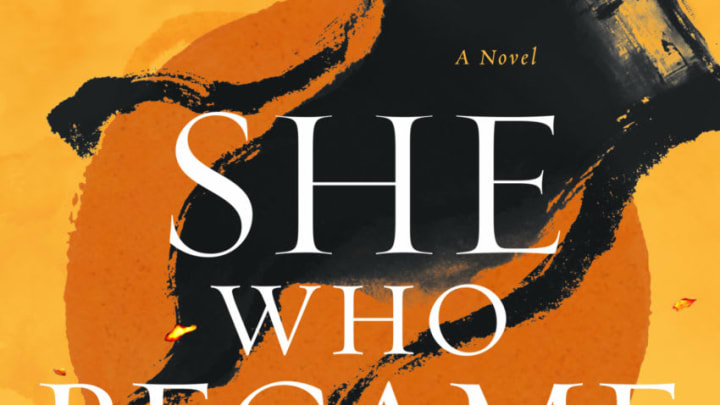Shelley Parker-Chan’s She Who Became the Sun is perhaps the most unexpected fantasy delight of the summer, a rich and deeply layered story that puts a fascinating – if slightly grim – twist on the historical Red Turban rebellion and the founding of the Ming Dynasty. And in doing so, it turns several centuries’ worth of stories and assumptions on their heads in the best way possible.
In a 14th century village stricken by famine, two children are shown their fates by a seer. For the family’s cruel, indolent eighth son, there’s greatness. For the second daughter, nothing. (Literally. That’s what the fortune teller says he sees.) But when their father is killed by bandits, it is Zhu Chongba who dies of grief, without claiming the great destiny that was promised him. Instead, it is his deliberately unnamed sister who assumes not just her brother’s identity, but his fate – and vows to claw her way to a future that Heaven itself has declared she should never have.
The sweeping alt-history that follows takes this Zhu from a Buddhist monastery to a rebel camp attempting to overthrow the Mongol rule of China, and She Who Becomes the Sun wrestles with everything from issues of gender and expectations, to fate and free will, as well as the pieces of ourselves we’re willing to sacrifice in order to get what we want.
Zhu’s tremendous drive to achieve her goals is the engine that powers this novel, and the completeness of both her sense of her self and the greatness she believes deserves to achieve are both admirable and slightly terrifying. Yet, this same desire is what gives her character such a distinctive, singular voice, making her into a character who is extremely difficult not to root for, even when she does questionable or even downright horrific things.
She Who Became the Sun is careful never to portray Zhu as a villain; however, rather, a realist who knows what needs to be done to achieve her goals and views any step toward that destiny as necessary, no matter how grim it might be. (A sequence in which she poisons her own men in order to avoid choosing a side in a political dispute is particularly shocking.) She sees the inevitable consequences for her actions – both for herself and for those around her – and she’s more than willing to face them if doing so is the price she must pay to take another step closer to her destiny.
It’s the same strange mix of horrifying and admirable that eventually comes to color many characters in this story.
The unstoppable force of Zhu’s desire finds its chief adversary in the immovable object that is eunuch General Ouyang, loyal commander of the Prince of Henan’s forces and a man with his own destiny to fulfill. As a eunuch, Ouyang has his own complex and complicated relationship to gender and gender performance, much as Zhu does, and it’s one that often finds him torn between his genuine connection to Esen, the prince’s son, and his lifelong desire to punish those that he feels took the future he deserved away from him when he was castrated.
Ouyang’s ultimate path is less about choosing himself, as Zhu does repeatedly, and more about chasing a decades-long revenge plot that will ultimately involve him betraying almost everyone around him. That these two – who each sit at such complex intersections of identity and gender and are ultimately not interested in much beyond their own goals – should become both mortal enemies and Machiavellian partners in crime feels simultaneously inevitable and deeply shocking.
She Who Became the Sun is a historical fantasy that’s meticulously researched, its worldbuilding rich and thorough. This is the sort of story that will not only have you digging into the history of the Ming dynasty in your spare time but hoping that the real story might have actually gone down this way. This novel is the first half of a duology and given where She Who Became the Sun ends – and you can probably guess that point from the title – the prospect of a sequel has rarely been so exciting.
Ten thousand years to the Radiant Emperor.
She Who Became the Sun is available now. Let us know if you’re planning to check it out.
